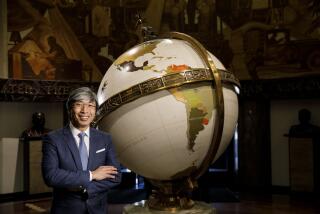Frankel Succeeds Rosenthal at New York Times
- Share via
The New York Times on Saturday named Editorial Page Editor Max Frankel to succeed the retiring A. M. Rosenthal as executive editor, one of the most important posts in American journalism.
Rosenthal, 64, will become a twice-weekly columnist and assume the title of associate editor, according to an announcement by Publisher Arthur Ochs Sulzberger in the newspaper’s Sunday edition. Rosenthal, who will turn 65 in May, is stepping down, effective Nov. 1, under the paper’s mandatory retirement policy.
Frankel, 56, is a former foreign and Washington correspondent, Washington bureau chief and Sunday editor of the newspaper. He won the Pulitzer Prize for reporting on President Richard M. Nixon’s trip to China in 1972, and became editorial page editor in 1977.
Frankel’s ascension had been rumored for months in newspaper circles, and speculation had recently turned to who would win key deputy posts.
Closest Aide Promoted
According to the announcement, Rosenthal’s closest aide, Deputy Managing Editor Arthur Gelb, 62, will take the No. 2 job of managing editor, the post held until recently by Seymour Topping. Topping is retiring to become director of editorial development for the New York Times Co.’s 32 regional newspapers.
Frankel will be succeeded as editor of the editorial pages by his deputy, Jack Rosenthal, 51. Leslie Gelb, 49, the paper’s senior Washington correspondent and former director of the State Department’s Bureau of Politico-Military Affairs under Jimmy Carter, will become deputy editorial page editor.
A. M. and Jack Rosenthal are not related, nor are Leslie and Arthur Gelb.
Abraham Michael Rosenthal, an emotional, creative New Yorker, has ruled the New York Times since becoming managing editor in 1969. He modernized the paper’s metropolitan coverage, improved its business section and oversaw the introduction of a series of weekly feature sections that helped revitalize the paper financially in the 1970s.
‘Writes Like a Poet’
His critics said, however, that morale suffered under Rosenthal’s mercurial dominance. “Abe writes like a poet but he has a poet’s temperament too,” said Richard Eder, a former Times drama critic and now a book critic for the Los Angeles Times.
In the announcement, Sulzberger said Rosenthal’s record “will last as a monument to one of the titans of American journalistic history.”
Frankel, Sulzberger said, is a “superb reporter and editor who has gained the full confidence of his colleagues and myself” in 34 years at the paper.
Frankel is considered more controlled and cautious than Rosenthal. Harrison Salisbury, a former New York Times correspondent and author of a history of the paper, said that Frankel “quieted the waters” as Washington bureau chief after the tumultuous removal of his predecessor, Tom Wicker. Salisbury predicted that as executive editor, Frankel will “soothe the ruffled feathers.”
‘Devoted to Ideas’
One former writer for the paper described Frankel as “a true intellectual in the sense that he is devoted to ideas.” Another former editorial writer under Frankel said he is “much more contemplative than Rosenthal, though they might in the end come to the same position. Max has much more nuance.”
Frankel was born in Gera, Germany, now in East Germany, and immigrated to the United States after his family was expelled in a mass roundup of Jews of remotely Polish ancestry. He attended Columbia University on a state scholarship and became editor of the college paper. He worked briefly for the New York Times before joining the Army in 1953, returning to the paper two years later.
Frankel nearly resigned from the paper in 1964 after Wicker’s short-lived appointment as Washington bureau chief. After accepting another job and writing a long letter of resignation to Sulzberger, he changed his mind. “He could not break the knot,” author Gay Talese wrote of Frankel in his book about the New York Times, “The Kingdom and the Power.”
More to Read
Sign up for Essential California
The most important California stories and recommendations in your inbox every morning.
You may occasionally receive promotional content from the Los Angeles Times.













